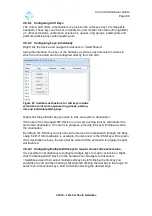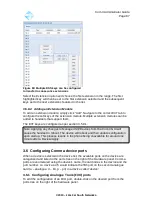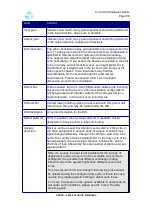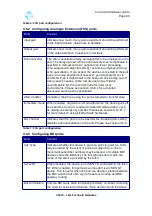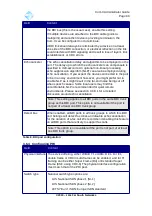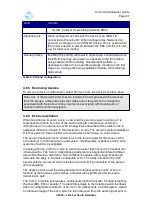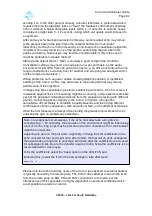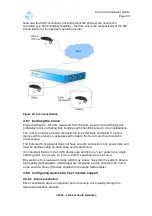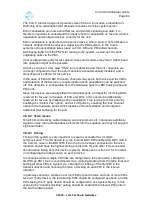
Com.X Administrator Guide
Page 95
This indicates to the Com.X that the receive direction clocking (from the 3
rd
party
device) should not be honored (as in the telco case), but that the Com.X should
propagate its system-derived timing to the 3
rd
party device. In such configurations the
3
rd
party device should be configured as a clock slave.
This additional configuration is not required for BRI ports, as the NT/TE mode setting
on BRI pre-selects the correct timing driver on the gateway leg facing the 3
rd
party
device. BRI timing configuration follows the same Line Priority and System
configuration pattern as described above for PRI.
If an iTA is connected to a switch located between the iTA and the Com.X host
server, network packet delays could occur which could also affect timing. If this is the
case, from the GUI, Monitor – Telephony – dahdi statistics should show slips and
skips increasing on the span to the iTA. The Com.X can be instructed to buffer in the
receive direction from the iTA in order to alleviate such network delays. This is done
by enabling the “Network slip tolerant” setting on the GUI under Setup – Global
Settings.
Please also refer to the Com.X troubleshooting guide for more information on fax and
modem troubleshooting.
3.6.8.4 Additional configuration for faxing over PRI
In order to enable clear-channel communication for fax over PRI, the PRI needs to be
configured to allow fax detection and the disabling of echo cancellation on fax calls.
This is performed by enabling the “Fax detect” setting on the PRI port in the
hardware panel.
3.6.8.5 Fax over IP
Com.X systems support t.38 faxing and g711 bypass on SIP trunks. With G.711
bypass, the trunk is configured for a compressed codec (e.g. G.729) as well as
G.711 A-law. The upstream gateway re-invites on detecting the fax tone, excluding
the G.729 from the allowed codecs. The Com.X switches to the A-law codec,
allowing clear channel fax transmission.
3.6.8.5.1 G.711 voice band data (ITU-T V.152)
Com.X features that support voice band data for fax over IP are:
•
Automatic G.711 bypass for fax (see above)
•
The default configuration of Com.X SIP is constant latency (i.e. fixed jitter
buffer)
•
Fax detection with automatic echo canceller disable is supported on
analog/ISDN channels where echo cancellation may impair the fax signal
•
The A-law codec does not use DC removal filters
•
Com.X VoIP does not use Comfort Noise Generation or Voice Activity
Detection
•
The SDP negotiation extensions (V.152 clause 7.1) are not supported in
Com.X. However, a switch to G.711 A-law on re-invite accomplishes the clear
channel requirement for voice band data, as described above.
©2010 –
2016
Far South Networks






